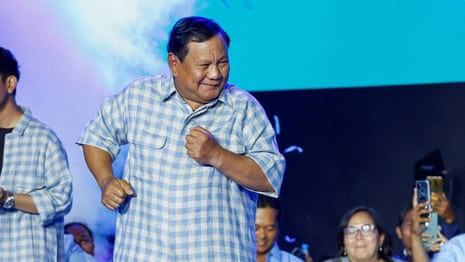[ad_1]
Human rights experts have condemned a decision by Indonesia’s outgoing president to award the rank of honorary four-star general to his presumed successor, Prabowo Subianto, a controversial figure accused of human rights violations.
Prabowo, 72, a former son-in-law of the dictator Suharto and a special commander under his regime was dismissed from the military over allegations he was involved in kidnapping and torturing pro-democracy activists in 1998.
Prabowo, who has since softened his image by presenting himself as a harmless grandpa, is presumed to have won this month’s presidential election. His campaign was boosted by the tacit support of Indonesia’s president, Joko Widodo, known as Jokowi, whose son was his running mate.
Wahyu Susilo, whose brother, the poet and activist Wiji Thukul, disappeared under Suharto’s regime, described Jokowi’s decision as “a sign that Indonesia is entering the dark ages again”.
“For victims’ families like mine, this is Jokowi’s betrayal of his political promises to resolve past human rights violations,” he said.
Jokowi said the award was “a form of appreciation as well as confirmation of one’s complete devotion to the people, nation and state”. A four-star general is Indonesia’s second-highest military rank, usually held by the officer who leads the country’s military.
Prabowo admitted in a 2014 interview with Al Jazeera that he was involved in kidnappings of activists during Suharto’s era, but said he was under orders and that his actions were legal.
Of more than 20 activists kidnapped in 1998, 13 are still missing.
Prabowo is also accused of involvement in rights abuses in Papua and Timor-Leste, which he has denied.
He was banned from entering the US for two decades over allegations of rights abuses, until he was appointed defence minister under Jokowi.
Gufron Mabruri, the executive director of the Indonesian rights group Imparsial, told the Associated Press the decision to award Prabowo with an honorary four-star title would “embarrass the honour and dignity of the Indonesian military”.
Prabowo’s campaign benefited significantly from the unofficial support of Jokowi, and the outgoing leader has been accused of interfering in the election to protect his legacy and establish a dynasty.
Andreas Harsono, Indonesia researcher for Human Rights Watch, said Jokowi was “using his presidential authorities to accumulate power for himself and his family, of course, using the military honour rule to serve his narrow interest and misleading the public about military service”.
According to unofficial tallies by polling agencies, based on millions of ballots sampled from the across the country, Prabowo secured more than 55% of the vote in on 14 February. Such counts have proved reliable in past elections.
[ad_2]




